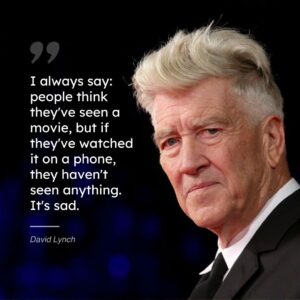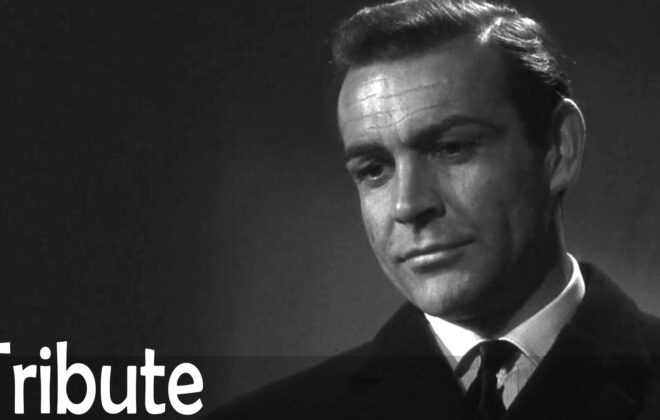David Lynch Biography
I was a teenager when Twin Peaks came out, and, like my fellow drama club friends, I decided it was one of the best shows on television. I bought the soundtrack and even read The Secret Diary of Laura Palmer, which was published to accompany the series. Of course, Blue Velvet was a revolutionary film in my eyes when I first saw it, and Eraserhead has been an inspiration for filmmakers and art-house cinema enthusiasts.
David Lynch has influenced and inspired multiple generations of filmmakers, whose name has become synonymous with surrealist storytelling that leaves audiences questioning what they just saw.
Early Life
David Keith Lynch was born on January 20, 1946, in Missoula, Montana, the oldest of three children to Donald Walton Lynch, a research scientist with the U.S. Department of Agriculture (USDA), and Edwina Lynch, an English language tutor. Due to his father’s work with the USDA, the family moved frequently, even living for a brief time in Spokane, Washington—the city where I lived when I first began watching David Lynch’s films and TV shows.
Lynch was interested in painting and drawing from an early age, a passion he continued to pursue throughout his life thanks to the encouragement of his parents. His mother encouraged him to draw on scraps of paper, where he could explore outside the lines, rather than in coloring books, where “the whole idea is to stay between the lines.”
He attended the Corcoran School of the Arts and Design in Washington, D.C., before transferring to the School of the Museum of Fine Arts in Boston and eventually to the Pennsylvania Academy of the Fine Arts.
It was in college that Lynch was introduced to the world of filmmaking, creating his first experimental film, Six Men Getting Sick (1967), which he shot using the cheapest 16mm camera he could find. The film led to his first commissioned work, and the money was used to experiment further, resulting in short films such as The Alphabet (1968) and The Grandmother (1970). These works established the unsettling, otherworldly style of filmmaking that would later be referred to as “Lynchian.”
David and his wife, Peggy, eventually moved their family to Los Angeles, where he began studying filmmaking at the AFI Conservatory.
Career
It was at the Conservatory in 1972 that lynch began working on Eraserhead. The film took five years to complete. This haunting black-and-white movie tells the story of a young man living in a dystopian industrial wasteland whose girlfriend gives birth to a deformed baby, only to abandon it in his care. The film explores themes of fatherhood, isolation, and existential dread. Though it initially had a limited release, Eraserhead has since become a cult classic along with just about every other film he made.
Eraserhead was seen by film producer Stuart Cornfeld, who showed it to Mel Brooks. Brooks loved both the film and Lynch’s unique style. Cornfeld and Brooks went on to produce Lynch’s next film, The Elephant Man (1980), written by Chris de Vore and Eric Bergren. The film is a biographical drama about Joseph Merrick, a severely disfigured man living in Victorian England. It was a major critical and commercial success, earning eight Academy Award nominations, including Best Director, and it brought Lynch to mainstream attention.
The success of The Elephant Man led Dino De Laurentiis to approach Lynch about directing a film adaptation of Frank Herbert’s science fiction novel Dune. However, the film’s troubled production and mixed reception left Lynch deeply dissatisfied with the final product. Forced to make significant concessions to the studio, Lynch had to cut many scenes from the film as he did not have final cut of the film. This experience taught him an important lesson, and on future projects, he insisted on having full creative control, agreeing to direct only if he retained final cut.
“Always have final cut.” – David Lynch to filmmakers.
Dune (1984) was a critical and commercial failure; it cost $45 million to make but grossed only $27.4 million domestically. Later, Universal Studios released an “extended cut” for television, which included nearly an hour of additional footage and new narration. Lynch was so unhappy with this televised version that he requested his name be removed from it, replacing it with a pseudonym. To date, multiple cuts of the film exist, but Lynch has preferred not to discuss any version of it.
After Dune, it might be surprising that Lynch and De Laurentiis were willing to work together again. However, they did, and this collaboration led to Lynch sharing the script for Blue Velvet (1986). De Laurentiis agreed to executive produce the film. The movie is a psychological thriller starring Kyle MacLachlan, Isabella Rossellini, and Dennis Hopper, who delivered one of his most chilling performances. Blue Velvet was both a critical and commercial success, solidifying Lynch’s reputation as a master of mood and atmosphere. The film also earned Lynch his second Academy Award nomination for Best Director.
Lynch won the prestigious Palme d’Or at the Cannes Film Festival in 1990 for the romantic crime drama Wild at Heart (1990), starring Nicolas Cage, Laura Dern, and Willem Dafoe. The film tells the story of Sailor and Lula, two young lovers on the run from Lula’s overbearing mother, who hires a series of sinister characters to track them down.
In an era when many filmmakers and actors frowned upon working in television, Lynch partnered with Mark Frost to create the groundbreaking series Twin Peaks. The show followed FBI Agent Dale Cooper, played by Lynch’s frequent collaborator Kyle MacLachlan, who is sent to the small Pacific Northwest town of Twin Peaks to investigate the murder of Laura Palmer.
With its quirky characters, offbeat humor, and supernatural overtones, Twin Peaks quickly became a cultural phenomenon. While we have an ample selection of cult films, cult television shows are far rarer, and Twin Peaks is undoubtedly on that short list.
In the 1990s, many movies were released with accompanying soundtracks, and I bought quite a few of them. However, this was far less common for television shows—except for Twin Peaks. The series likely wouldn’t have reached such great heights without its haunting soundtrack, including the unforgettable theme by composer Angelo Badalamenti.
Twenty-five years after the cliffhanger ending of season two, the show received a long-awaited revival with Twin Peaks: The Return in 2017, offering a chance to tie up some of its loose ends.
In 1999, Lynch wrote and directed Mulholland Dr., which was originally intended to be a television series but was later reimagined as the 2001 film Mulholland Drive, starring Naomi Watts, Laura Harring, and Justin Theroux. (I guess Kyle MacLachlan must have been busy.) Don’t worry, though, the two would continue to collaborate on various projects throughout Lynch’s career. Lynch received his third Academy Award nomination for Best Director for Mulholland Drive.
Into the 2000s, Lynch scaled back on feature film work, focusing instead on short films and music videos. His final feature film was Inland Empire (2006). Lynch seemed to feel that the industry’s growing focus on blockbusters and sequels made it difficult to secure funding for his particular style of filmmaking.

So Much More!
David Lynch was more than a filmmaker. He was an accomplished artist, always painting and drawing throughout his life. He was also a photographer and a musician. His albums, such as Crazy Clown Time (2011), highlight his experimental approach to sound, while his visual art captures the same dreamlike and surreal quality that defines his films.
Lynch also embraced unique ways to connect with his audience. Until 2022, he delivered daily weather reports on his YouTube channel, a quirky ritual that endeared him to fans. As a devoted coffee lover, he even launched his own line of organic coffee called David Lynch Signature Cup.
Personal Life
While attending the Pennsylvania Academy of the Fine Arts, Lynch met Peggy Reavey. The two married in 1967, and shortly after, Peggy gave birth to their daughter, Jennifer Lynch, who would go on to become a filmmaker and author. Lynch and Peggy amicably divorced in 1974.
In 1977, Lynch married Mary Fisk, but their marriage eventually ended. He later married Mary Sweeney, a frequent collaborator and the editor of several of his films, in 2006. Their marriage was short-lived, and Lynch’s final marriage was to actress Emily Stofle in 2009. The two separated in 2023 and were in the process of divorcing at the time of his death.
Over the course of his life, Lynch had four children, including Jennifer, who became well-known in her own right, and Riley, who pursued a career in music.
Legacy and Death
Despite his surreal and often unsettling artistic output, Lynch was known for his calm and optimistic demeanor, which he attributed to his long-standing practice of Transcendental Meditation. Over the course of his career, he received numerous awards, including an honorary Academy Award in 2019 for his contributions to cinema.
For those interested in learning more about his work and philosophy, there are hundreds of hours of interviews and documentaries featuring Lynch discussing his creative process, various endeavors, and life lessons.
A lifelong smoker, Lynch was diagnosed with emphysema in 2020 and was eventually forced to rely on supplemental oxygen. David Lynch passed away just four days shy of his 79th birthday, on January 16, 2024.
His work continues to inspire filmmakers, musicians, and artists, who are drawn to his ability to blend beauty and darkness, the ordinary and the bizarre, into worlds that only the mind of David Lynch could dream up.
David Lynch – January 20, 1946 – January 15, 2025
Related Posts
Leave a Reply Cancel reply
This site uses Akismet to reduce spam. Learn how your comment data is processed.





